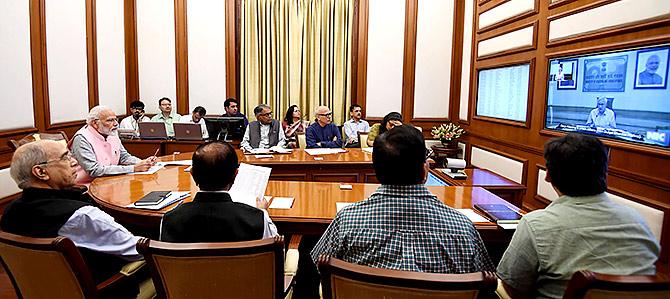The Centre has taken a major step towards increasing efficiency in decision-making by empowering joint secretaries to report to secretaries directly, officials said on Wednesday.

Joint secretaries usually route files via additional secretary or equivalent, they said.
"A major step of de-layering is being implemented in almost all the central government departments. With this, all joint secretary (JS)/equivalent report directly to the secretary and an under secretary (US)/deputy secretary (DS) report directly to additional secretary/equivalent," a senior official said.
The step is aimed towards increasing efficiency in decision-making, he said.
The department of administrative reforms and public grievances (DARPG) under the personnel ministry said all ministries have been asked to ensure that a file does not move through more than four officers.
All ministries have been advised that no physical papers or receipts should be generated for inter/intra ministerial circulation, it said in the report.
"The ministries should ensure that a file should not move through more than four levels," reads the recent report.
Talking to PTI, DARPG secretary V Srinivas said secretariat reforms envisage a three-pronged approach -- special campaign for institutionalising swachhata and minimising pendency, initiative for increasing efficiency in decision-making by de-layering, delegation of financial powers, adoption of desk officer system and digitisation of the central registration units; and third adoption of e-office version 7.0.
"The monthly progress (being undertaken by the DARPG) institutionalises the monitoring of progress and ensures adequate momentum in achieving deep and far-reaching secretariat reforms. Collectively all three initiatives will create a digitally transformed government," he said.
Full implementation of de-layering implies that all JS/equivalent report directly to the secretary and US/equivalent report directly to JS/equivalent and DS/equivalent report directly to AS/equivalent, it said, explaining the process.
"Out of 74 ministries/departments which have submitted self-assessment forms, 91% of ministries/departments have de-layered. However, there are still few ministries where the joint secretary is reporting through the additional secretary," the report said.
The DARPG had in August last year asked all central government ministries to implement a "four-pronged approach" including "de-layering" for increasing efficiency in decision-making.
"Governance reforms through efficient decision making have been seen to be one of the top priorities of the government to make the administration responsive, accountable and citizen centric," it had said.
In this context, the central secretariat had in 2021 adopted the initiative for increasing efficiency in decision-making in the government.
"Under this initiative, a four-pronged approach was adopted by the central government with DARPG being the nodal department for implementing the same," the order had said.
Reforms of de-layering, delegation, digitisation and desk officer system have led to defined work allocation, reduced channels of submission and timely decision-making, embodying the principle of 'minimum government, maximum governance', another senior officer said.
The railways ministry, road, transport and highways ministry, external affairs ministry, ministry of textiles, culture ministry, tribal affairs ministry, central board of direct taxes, department of youth affairs, department of biotechnology, department of atomic energy, department of empowerment of persons with disabilities and DARPG among others have been "fully de-layered", according to the latest report.
Besides these, the civil aviation ministry, steel ministry, minority affairs ministry, ministry of new and renewable energy and ministry of skill development and entrepreneurship have also been "fully de-layered".
Whereas, the ministry of electronics & information technology, mines ministry, power ministry, corporate affairs ministry, information and broadcasting ministry, labour and employment ministry, housing and urban affairs ministry, coal ministry, ministry of water resources, river development & Ganga rejuvenation and the department of personnel and training (DoPT) have been "partially de-layered", the report said.
The home ministry, panchayati raj ministry, ministry of environment, forest and climate change, department of agriculture, cooperation and farmers welfare, department of military affairs and department of health and family welfare have "not been de-layered", it said.











 © 2025
© 2025